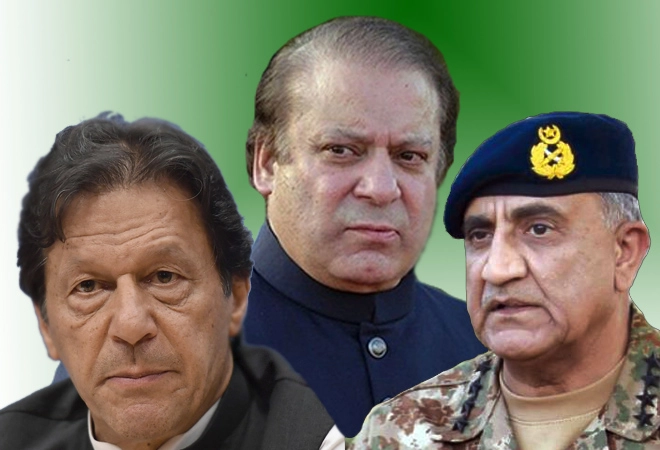Pakistan has maintained a powerful and disciplined military and intelligence service since its inception, owing to its need to counter India, its largest enemy. In addition, fragmentation and a lack of coordination among civil institutions permitted the military to meddle in the state’s most important internal and international concerns. Another factor is that the national psyche’s acceptance of tyranny played a key role in justifying military involvement in civil institutions.
Meanwhile, When Pakistan became embroiled in domestic political and constitutional challenges less than a decade after its founding, the military leadership took advantage of the situation and established a military government that has since been repeated. Extremist ideology, a weak constitution, disdain for the land and countrymen, intolerance against outsiders, a lack of faith, focus, and power greed have all contributed to our country’s demise. We failed to establish ourselves as an economic heavyweight in the Islamic world as well as on the continent of Asia, both economically and ethically.
However, Pakistan is officially a democratic country, yet feudalism, cronyism, and family dynasties dominate the political structure. No one can call it a democratic state since there’s no accountability or merit. All of our political leaders are feudal mafias that have swamped our parliament and are neither leaders nor concerned about their constituents. Votes are cast for dumb reasons rather than merit or efficiency. Pakistan’s prosperity and progress are dependent on the implementation of real democracy, which includes all of its ideals and practices.
However, because the British left us with so many problems, whether we liked it or not, we needed to keep a robust military for our existence, security state military interests prevail in strategic talks as well as in critical domestic and international matters. And that it’s only normal for the military to take precedence over civilian authority in a security state. Military colleges and sub-institutes in Pakistan are more disciplined and unified than famous civil institutes, making it easier for the military establishment to take control of the political system and dominate both domestic and foreign affairs.
The military is an entity that protects national security, but it cannot participate effectively in politics since politics requires expertise, which can only be gained by years of public sector employment. Military interventions have always resulted in turmoil, which leads to a political structure that is undeveloped. Political progress is only possible if political institutions are stable.
Pakistan’s military is the country’s most powerful and well-organized organization, having taken power four times since its founding. The first military interference in civilian affairs occurred shortly after Pakistan’s independence, when the then-Prime Minister of Pakistan, “Khawaja Nazim ud Din,” cut the military budget by one-third in 1953. Governor-General Ghulam Muhammad fired him at the time, and this action by the Governor-General strengthened the military’s position. It was the first time the military institution had experience with civilian matters. Following this, when Muhammad Ali Bogra formed his cabinet in 1954, he awarded the Defense Ministry to General Ayub Khan, the army’s Commander in Chief, and the Home Ministry to General Iskandar Mirza.
Civilian supremacy was severely harmed by “Muhammad Ali Bogra’s” judgment. General Iskandar Mirza, Pakistan’s president at the time, was the first to declare martial law. He appointed General Ayub Khan as Chief Martial Law Administrator and Prime Minister of Pakistan, but he was forcibly removed by General Ayub, who then became President of the country, and ruled the country under martial law until 1962 when he civilianized his rule and stayed in power until 1969 when General Yahiya took power, and he surrendered power to civilian leaders in 1971 after the separation of East Pakistan. In 1977, “General Zia ul Haq” staged the third coup attempt.
He served as the martial law administrator until 1985, making it the longest martial law in Pakistan’s history. When he perished in an aircraft crash in 1988, his reign came to an end. Soon after Pakistan’s defeat in the Kargil conflict against India in 1999, civil-military ties deteriorated once more. This chasm in civil-military ties prepares the ground for the country’s most recent coup. General Pervez Musharraf overthrew Sharif’s administration in the fourth coup in 1999. He was in power until 2008. He resigned as president because he was afraid of a no-confidence vote.
Other institutions in Pakistan are weakened since military regimes rule for about half of the time. A country’s third power center became the army chief. It morphed into a power trio, and no civilian administration can make critical internal, national, or international decisions without the COAS’s input. In Pakistan, there was a political leadership crisis, which allowed the army to have a taste of civilian life. The army establishment has vested interests in the political system, and they believe that the political leadership is incapable of resolving these issues in Pakistan’s advantage. The Army aspires to be a part of national policy and nuclear decision-making.
The army establishment frequently expresses the opinion that civilian leadership is morally and financially corrupt, and that they have no loyalty to their country. Army also wants a say in foreign policy or negotiations, particularly with the United States, China, Afghanistan, and India, as well as the nations from which they buy weapons or military equipment. When a government attempts to slash the military budget, the army institution invariably expresses profound concern.
Last but not least, in the presence of feudalism, democracy never exists. In such environments democracy is just the business of the elite class. Life of poor Pakistanis will never change in such circumstances unless land reforms and restoration of student unions took place.
